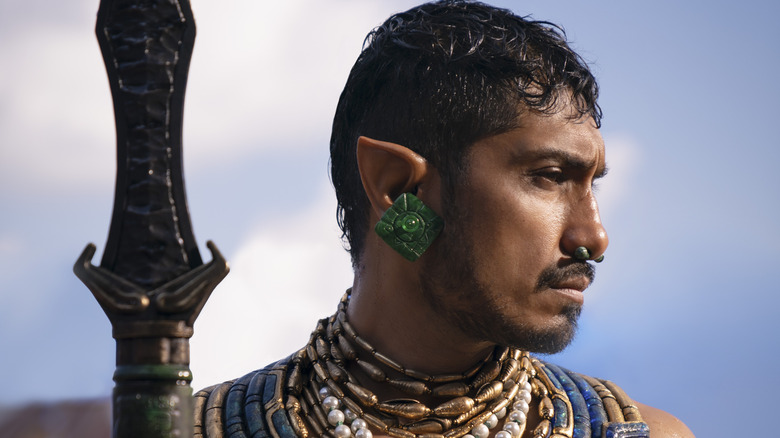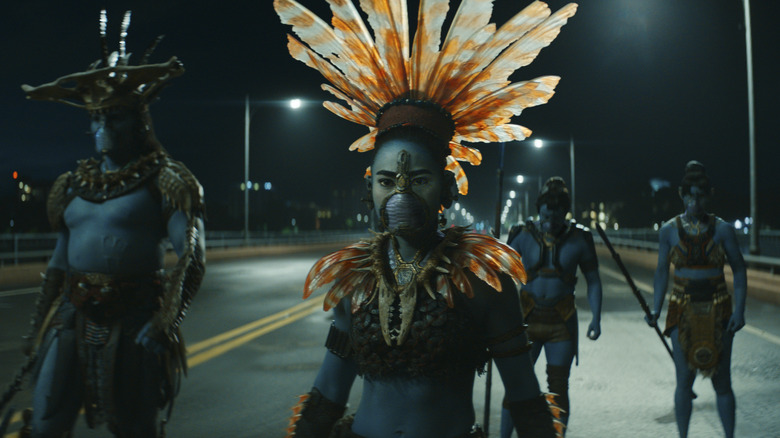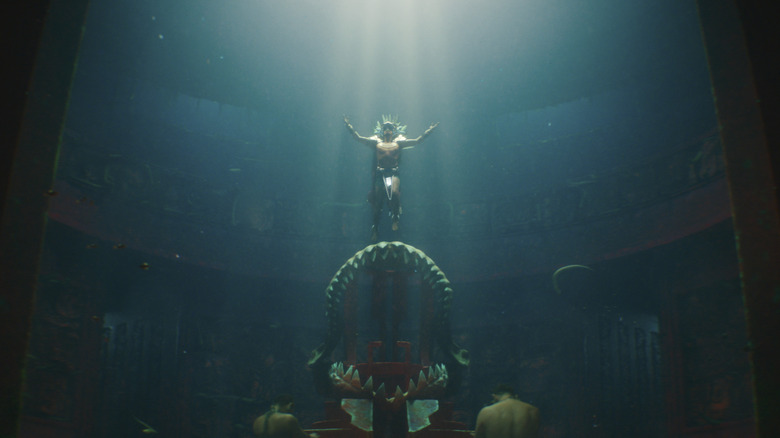Black Panther: Wakanda Forever Lets Namor Have A Point – And The Movie Is Better For It
Major spoilers ahead for "Black Panther: Wakanda Forever."
"Black Panther: Wakanda Forever" has finally hit theaters, and we now know how Namor fits into the Marvel Cinematic Universe. Played by Tenoch Huerta Mejía, this underwater dweller is a mutant who can fly and lives an unusually long life. He rules his people — the Talokan — in his ocean kingdom and has kept it secret for centuries.
These are people who have vibranium, just like the African nation of Wakanda. When someone creates a device to detect and steal it to keep up with the newly revealed Wakandan technology and defense, let's just say he's unhappy. He tries to talk (though it's not really a negotiation) to Queen Ramonda (a spectacular Angela Bassett), but when it doesn't work, he goes on the attack.
The mark of a good antagonist is that they aren't always a villain. It's rare when a film can pull that off effectively, but "Black Panther" has done it before in the form of Erik Killmonger (Michael B. Jordan). No matter what you thought of his methods, he wasn't wrong about Wakanda's hoarding of vibranium and its effect on centuries of African history. He wasn't wrong about choosing to die free instead of living in captivity.
Whether or not you agree with the way he went about it, his death scene was hard to watch because you kind of got what he was saying. "Wakanda Forever" has a similar antagonist in that Namor isn't really wrong about keeping his people safe, despite the way he goes about it.
I mean, he has a point
Namor has no reason to trust the world on land. His people, including his mother, who took a very special herb, ended up under the water, able to breathe, but his birth was different. He can breathe both air and water. He has teeny wings on his ankles and pointed ears and is worshiped like a living god in his kingdom. His return to the surface to bury his mother showed him how the people he came from suffered from colonization. It stuck with him and seeing someone try to take his country's resources now reminds him of that. He wants to take down the scientist who helped the upper world harm his people. Why wouldn't he?
Sure, he's not taking the other side into consideration, but can you blame him? He didn't attack them first. They came to take his things. When Wakanda won't help him, he and his people attack them. This is going to change the shape of the MCU — not just because of the attack on Wakanda, but because we have a new superpower and a mutant. The world might not know that Ms. Marvel, aka Kamala Khan (Iman Vellani), is a mutant, but they know he is, and with a major mutant as a threat ... well, this boat ride is about to get choppy.
Just hating an enemy is a weak position. It's easier, but being able to really understand someone's motives is important. It matters if you're going to fight them and if you're going to negotiate. In fact, despite the outcome, the fact that Shuri (Letitia Wright) was willing to talk with Namor and their discussion really gave the film some perspective.
Understanding your enemy
Namor isn't a bad person/mutant/fish guy. He understands that a good ruler is often someone who has been through difficult things. He has, and Shuri has. The connection between them kept the big brawl for it all at the end of the film from being a CGI blur. Of course, we were rooting for Wakanda, but as each Talokan warrior was hurt, you felt bad, knowing what they were fighting for as well. It made you care about each side, so every person that fell gave you a little gut punch, even if you never knew their names.
It's very hard to destroy someone when you understand them. It's even harder when you sympathize with them and know that what they're fighting for makes sense. Namor's people love him. They have a home that is as valid as any other in the world. He might be a bit of a jerk sometimes, but knowing that the argument is complex makes it more compelling to watch. Thanos as the big bad in the last phase of the MCU is an interesting comparison here. Yes, his argument did have some logic, but his methods were so outrageous that you could never really get on board with him. With Namor, you can, and even if you don't, you really can't hate him.
This is all going to cause a huge shift in the fictional world we love so much, but this shift isn't going to be the same as when Thanos or the Chitauri attacked. The countries of the world are fighting each other, which means that when the next big bad comes, and they have to find a way to work together, we're in for a much more interesting ride.
"Black Panther: Wakanda Forever" is in theaters now.


